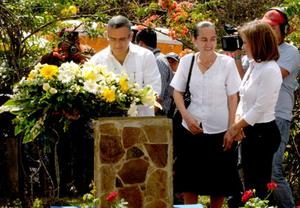Sister Cities
The 20th Anniversary of El Salvador’s Peace Accords and Martin Luther King
Keynote Address at the Salvadoran Consulate of New England on January 16, 2012
by Jim Wallace, Cambridge-Las Flores Sister City
The Boston area has a long history of solidarity with El Salvador: U.S.- El Salvador Sister Cities, CISPES and the Sanctuary Movement of the 1980s. We had three church communities participating in the Sanctuary movement. During the Salvadoran armed conflict in the 1980s, we established sister relationships with communities in northern El Salvador:  Cambridge, Arlington, Watertown, and for a while Belmont, Somerville and Boston all participated. These relationships were requested by Salvadoran communities with the awareness that U.S. citizens can complain to their congressmen about military aid to El Salvador when it was used to displace and oppress people in El Salvador.
Cambridge, Arlington, Watertown, and for a while Belmont, Somerville and Boston all participated. These relationships were requested by Salvadoran communities with the awareness that U.S. citizens can complain to their congressmen about military aid to El Salvador when it was used to displace and oppress people in El Salvador.
Today we commemorate two profoundly important events: 1) the life of Martin Luther King and 2) the 20th anniversary of the signing of the Peace Accords, January 16, 1992 in Chapultepec Park in Mexico City.
Let me begin with some nearly forgotten words of Martin Luther King, Jr., exactly one year before his murder. He spoke in the context of the U.S. war against Vietnam.
“As I have walked among the desperate, rejected, and angry young men, I have told them that Molotov cocktails and rifles would not solve their problems. I have tried to offer them my deepest compassion while maintaining my conviction that social change comes most meaningfully through nonviolent action. But they ask — and rightly so — what about Vietnam? They ask if our own nation wasn’t using massive doses of violence to solve its problems, to bring about the changes it wanted. Their questions hit home, and I knew that I could never again raise my voice against the violence of the oppressed in the ghettos without having first spoken clearly to the greatest purveyor of violence in the world today — my own government. For the sake of those boys, for the sake of this government, for the sake of the hundreds of thousands trembling under our violence, I cannot be silent.
………
[In a sense Martin King was a prophet of the conflict that arose in El Salvador a decade in the future when King said:]
“The words of the late John F. Kennedy come back to haunt us. Five years ago he said, “Those who make peaceful revolution impossible will make violent revolution inevitable.” Increasingly, by choice or by accident, this is the role our nation has taken, the role of those who make peaceful revolution impossible by refusing to give up the privileges and the pleasures that come from the immense profits of overseas investments. I am convinced that if we are to get on the right side of the world revolution, we as a nation must undergo a radical revolution of values. We must rapidly begin… the shift from a thing-oriented society to a person-oriented society. When machines and computers, profit motives and property rights, are considered more important than people, the giant triplets of racism, extreme materialism, and militarism are incapable of being conquered.
A true revolution of values will soon look uneasily on the glaring contrast of poverty and wealth. With righteous indignation, it will look across the seas and see individual capitalists of the West investing huge sums of money in Asia, Africa, and South America, only to take the profits out with no concern for the social betterment of the countries, and say, “This is not just.” It will look at our alliance with the landed gentry of South America and say, “This is not just.” The Western arrogance of feeling that it has everything to teach others and nothing to learn from them is not just.
A nation that continues year after year to spend more money on military defense than on programs of social uplift is approaching spiritual death.
These are revolutionary times. All over the globe men are revolting against old systems of exploitation and oppression, and out of the wounds of a frail world, new systems of justice and equality are being born. The shirtless and barefoot people of the land are rising up as never before. ‘The people who sat in darkness have seen a great light.’ We in the West must support these revolutions.”
Returning to the Peace Accords, some people say we should not celebrate this anniversary of the Peace Accords, but try to rescue them.
The main purpose of the agreements was to mark the end of armed conflict.
What achievements were accomplished in 1992?
1) The peace accords were signed in Mexico.
2) A cease fire began under UN supervision.
3) A UN Truth Commission launched an investigation into human rights violations.
4) The Secretary General concluded that the military in El Salvador does not comply with peace agreements.
5) The UN published the results of the Truth Commission investigations.
6) Senior military officials resigned in El Salvador.
7) U.S. ended military aid to El Salvador.
That is, the year 1992 marked a turning point in the history of El Salvador.
Many other points of the peace accords have been realized, e.g.
-The definite end of the armed conflict
-The dissolution of the infantry battalions for immediate response
-The suspension of forced recruitment
-The formation of the National Civilian Police
-The establishment of the National Ombudsman for the Defense of Human Rights
-The formation of the FMLN as a political party.
Still there are challenges and obstacles in meeting other points, for example in the areas of
-The transfer of land
-The reform of the electoral system
But in the final analysis, the major failure of the peace accords has been that impunity is still a pervasive problem.
The Inter-American Commission on Human Rights (IACHR) and its Court ordered the Salvadoran government to fulfill this obligation in landmark cases such as the 1980 assassination of Monsignor Romero, and of the Jesuit priests in 1989. However, the State has not complied. In addition, in 2000, the IACHR ordered that El Salvador repeal the General Amnesty Law, which has been in force since 1993. This law is still an obstacle to obtaining justice in war crimes. The Constitutional Chamber of the Salvadoran Supreme Court ruled in 2000 that the General Amnesty Law does not apply to gross violations of human rights, but there still have not been investigations of major cases. There is hope that the courts of Spain might be able to prosecute some of those who have committed terrible atrocities in El Salvador.
But still, the people accused of the murder of Roque Dalton have been dismissed by the Attorney General. And the recent cases of murders of people organizing against mining have not been investigated by the Attorney either.
This means that the struggle must continue for justice for the existence of true peace.
I end with the words of Martin Luther King from his speech in 1967:
“This call for a worldwide fellowship that lifts neighborly concern beyond one’s tribe, race, class, and nation is in reality a call for an all-embracing — embracing and unconditional love for all mankind. … I am speaking of that force which all of the great religions have seen as the supreme unifying principle of life. Love is somehow the key that unlocks the door which leads to ultimate reality.
And if we will only make the right choice, we will be able to transform this pending cosmic elegy into a creative psalm of peace. If we will make the right choice, we will be able to transform the jangling discords of our world into a beautiful symphony of brotherhood. If we will but make the right choice, we will be able to speed up the day, all over America and all over the world, when ‘justice will roll down like waters, and righteousness like a mighty stream.’ “
Thank you for your attention.
{mosimage}


